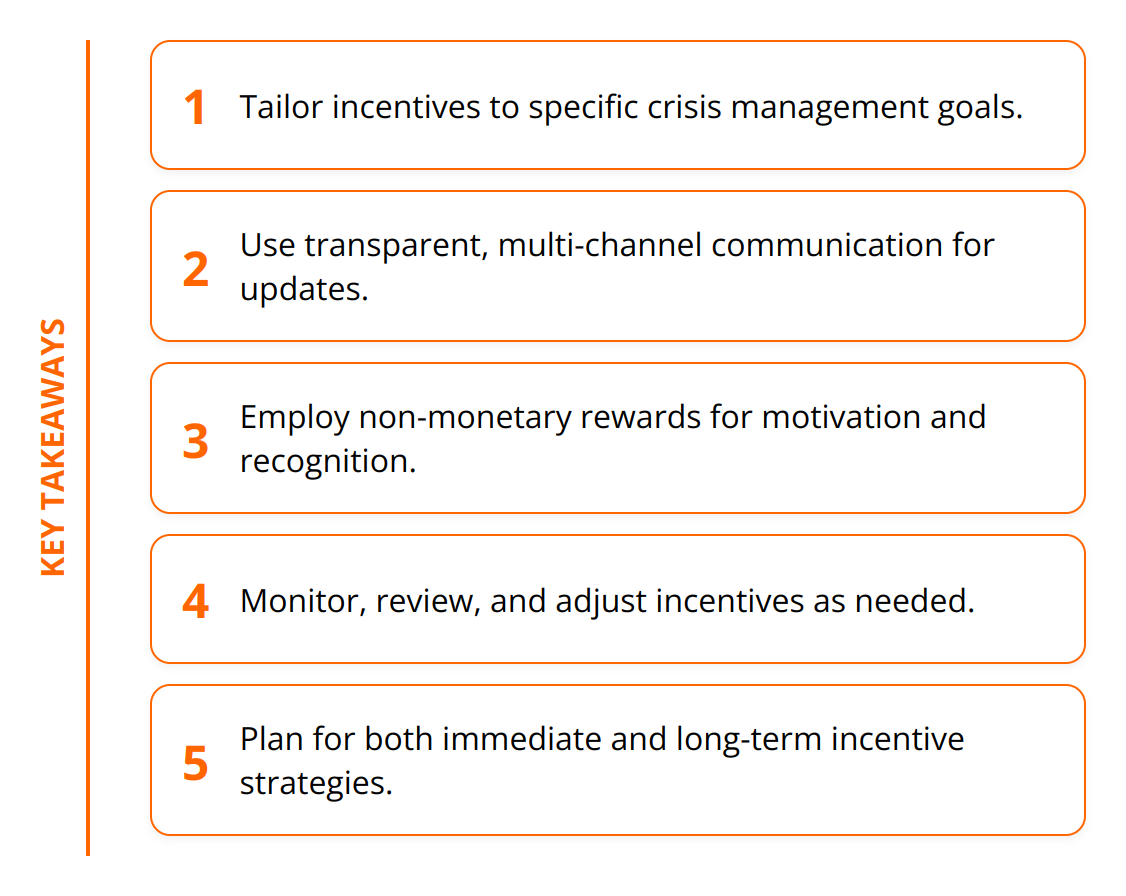
We at Reward the World believe that the right incentives can turn crisis management from a daunting challenge into an opportunity for growth and cooperation. Understanding how to leverage these incentives effectively is key to maintaining motivation and securing stakeholder cooperation during tough times. This blog post: How to Incorporate Incentives in Crisis Management will guide you through designing, implementing, and reflecting on incentive programs tailored for crisis situations, drawing on real-life examples and proven strategies. Let’s explore how strategic incentives can make a significant difference in how crises are managed and overcome.
Leveraging Incentives During Crises
In times of crisis, harnessing the power of incentives becomes not just beneficial but necessary for nurturing motivation and fostering collaboration among stakeholders. Incentives act as a driving force that can lead teams through challenging periods, ensuring business continuity and even paving the way for growth despite adversities.
The Power of Incentives
At the heart of any effective crisis management strategy lies the understanding that humans are motivated by rewards. Whether it’s the promise of recognition, financial gain, or professional development, incentives can propel individuals and teams to remain committed and proactive in the face of challenges. The key is to align these rewards with the goals of crisis resolution and recovery.
Incentives Foster Motivation and Cooperation
During a crisis, maintaining morale and motivation is essential. Tailored incentive programs can meet this need by providing clear goals and rewards for achieving them. This approach not only helps keep the team focused but also encourages cooperation, as team members work together towards a common objective with shared benefits at stake.
Real-Life Successes
Examples of successful incentive use in past crises abound. During the 2008 financial crisis, companies that maintained or even increased their incentive programs often saw less turnover and higher employee engagement compared to those that made cuts. Similarly, amidst the COVID-19 pandemic, businesses that offered additional support and incentives, such as hazard pay or flexible work arrangements, not only retained their workforce but often saw increases in productivity and employee satisfaction.
Practical tips for employing incentives in crisis situations include:
- Communicate Clearly: Ensure all team members understand the available incentives and what they need to do to achieve them.
- Be Flexible: Adapt incentive programs as the situation develops to keep them relevant and motivating.
- Focus on Non-Monetary Rewards: Recognize efforts through public acknowledgment, extra time off, or opportunities for professional growth.
- Monitor and Adjust: Keep an eye on the performance metrics and feedback to fine-tune the incentive program for maximum effectiveness.

Implementing strategic incentives is not about extravagant spending; rather, it’s about wisely utilizing rewards to maintain operations and morale during crises. For more details on designing effective incentive strategies, explore our comprehensive guide on incentive program analytics.
The correct application of incentives during crisis periods underscores an organization’s resilience and commitment to its team, often leading to enhanced loyalty and performance long after the crisis has passed. By carefully designing and implementing an incentive-based approach to crisis management, businesses can not only survive difficult times but emerge stronger and more cohesive.
Crafting Effective Incentives
In the wake of any crisis, the spotlight often turns to how organizations can sustain operations, morale, and productivity despite the uncertainties. A well-thought-out incentive program is instrumental in navigating these turbulent times. However, creating an effective incentive landscape requires a deep understanding of desired outcomes, stakeholder preferences, and the delicate balance between immediate needs and long-term objectives.
Identifying Outcomes and Tailoring Incentives
First and foremost, define clear outcomes that your organization aims to achieve during and after the crisis. These could range from maintaining a certain level of productivity, ensuring employee well-being, to enhancing customer loyalty. Once these outcomes are established, the next step is to match incentives to these specific goals.
For instance, if the goal is to boost productivity, consider a mix of individual and team-based rewards. For improving morale and well-being, non-monetary rewards like a paid day off, professional development opportunities, or a public acknowledgment of an employee’s effort can be highly effective.
Tailoring incentives to different stakeholders is another critical aspect. Employees, customers, and partners might have vastly different needs and motivations. Employees might value flexible working conditions and recognition, customers might appreciate discounts or loyalty points, while partners could benefit from extended support or relaxed payment terms.
Long-Term vs. Short-Term Strategies
Balancing short-term and long-term incentives is akin to walking a tightrope. In the short term, immediate rewards can fuel motivation and provide quick wins, critical in a crisis. These might include spot bonuses for employees going the extra mile or immediate perks for customers sticking with you through tough times.
However, for long-term resilience and loyalty, strategize beyond the crisis. Implementing a tiered loyalty program for customers or establishing a comprehensive employee growth path can create enduring commitment.

Practical Guidelines for Implementation
- Flexibility is Key: Be ready to adapt your incentives as situations evolve. What works at the onset of a crisis may not be as effective in later stages.
- Communication Matters: Whether it’s through newsletters, team meetings, or specialized communication platforms, keep all stakeholders informed about what rewards are available and how they can be attained.
- Measure and Iterate: Utilize feedback and performance data to gauge the impact of your incentives. Be prepared to make adjustments to ensure that your program continues to meet its objectives efficiently.
Implementing these strategies requires deliberate planning and execution but remember, a crisis also presents an opportunity to strengthen bonds with employees, customers, and partners through thoughtful incentives. For further insights on creating loyalty in times of crisis, exploring our piece on loyalty rewards programs can offer additional perspectives.
By approaching incentive programs with a clear strategy and a focus on adaptation, organizations can not only navigate crises more effectively but also emerge stronger and more cohesive in the aftermath.
Effective Incentive Deployment
Implementing incentives during a crisis requires a strategy that is flexible, adaptable, and immediate. The success of such programs hinges on effective communication, real-time monitoring, and the ability to adjust incentives based on evolving circumstances. Drawing on a blend of practical steps and a detailed case study, this section dives into how organizations can successfully execute incentive initiatives during challenging times.
Strategic Communication Is Key
Introducing incentives in a crisis situation demands clear, transparent, and ongoing communication. Here are actionable steps to ensure effective communication:
- Launch with Transparency: Clearly articulate the why, what, and how of the incentive program. Stakeholders should understand the purpose behind the incentives and how they align with broader crisis management efforts.
- Continuous Updates: As the crisis evolves, so should your communication. Updates on incentive achievements, changes to the program, and acknowledgments of individual or team contributions reinforce the value of the program.
- Use Multiple Channels: Rely on a variety of communication platforms to reach your audience. Emails, company intranets, video conferences, and social media can all play a part in keeping everyone informed and engaged.
Real-Time Monitoring and Adjustments
For incentive programs to remain effective during crises, they must be closely monitored and flexible enough to adapt to changing conditions. Here’s how to manage this dynamic:
- Set Clear KPIs: Establish key performance indicators (KPIs) related to both the crisis management goals and the incentive program itself. This could include employee engagement levels, customer satisfaction scores, or sales figures.
- Frequent Reviews: Regularly assess the program’s effectiveness against your KPIs. This might mean weekly or even daily reviews, depending on the pace of the crisis.
- Be Prepared to Pivot: If certain incentives aren’t working as anticipated, don’t hesitate to revise or replace them. Flexibility is paramount in ensuring the incentive program continues to meet its objectives.

A Case Study: Incentives During COVID-19
The COVID-19 pandemic presented unprecedented challenges for businesses worldwide. One particular success story comes from a retail company that swiftly implemented a comprehensive incentive program. Recognizing the immediate impact on its workforce, the company introduced hazard pay, flexible working hours, and mental health support as incentives for its employees. Additionally, they offered substantial discounts and free delivery for customers to encourage loyalty and repeat business during lockdown periods.
The outcome? Employee morale remained high despite the challenging working conditions, leading to a noticeable improvement in customer service ratings. Furthermore, the company saw a surge in online sales, largely attributed to the incentives provided to customers.
This example demonstrates the potent combination of well-thought-out incentives, strategic communication, and the agility to refine the approach as circumstances change. For those looking to dive deeper into analytics and monitoring techniques, our guide on incentive program analytics offers further insights.
In summary, the successful deployment of incentives during a crisis hinges on their relevance, the effectiveness of communication strategies, and the organization’s ability to adjust swiftly. By adopting a flexible, stakeholder-focused approach, businesses can navigate crises more smoothly while laying the groundwork for post-crisis recovery and growth.
Final Thoughts
In this blog post, we’ve explored the critical role that incentives play in crisis management. From maintaining morale during challenging times to fostering loyalty and encouraging growth, strategic incentives are a powerful tool for navigating uncertainties.

- Incentives drive motivation and cooperation, making them indispensable during crises.
- Flexibility, communication, and adaptability are key to implementing successful incentive programs.
- Real-life examples demonstrate how correctly applied incentives can lead to remarkable outcomes, such as enhanced loyalty and increased productivity.
The potential impact of well-designed incentives cannot be overstated. They not only help manage the immediate challenges but also lay the groundwork for long-term recovery and success. An effective incentive program reflects an organization’s resilience and commitment to its team, often resulting in enhanced loyalty and improved performance well beyond the crisis period.
We encourage businesses to incorporate strategic incentives into their future crisis management plans. By doing so, they can not only weather the storm but also emerge stronger. It’s about looking beyond the crisis and seizing the opportunity to innovate and strengthen bonds with employees, customers, and partners.
For organizations looking to craft and implement impactful incentive strategies, Reward the World offers an extensive rewards platform that can elevate engagement and boost company performance. With our global incentives platform, businesses can seamlessly integrate diverse rewards to meet their specific needs during crisis times and beyond.
Remember, the success of any crisis management effort is significantly amplified by the thoughtful use of incentives. It’s not just about surviving; it’s about thriving in the face of adversity.
